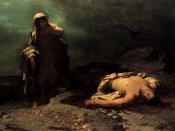Mortal Law Verses Divine Law
Laws were just as important to ancient societies as they are today, keeping an essential balance between interacting individuals. Without them, members of a society would be able to treat their fellow citizens in any way they wished, even if for purely personal gain. Some of these laws were made by the leader or leaders of the society. These were accepted as being for the common good. Other laws were developed within the society, things deemed "socially acceptable." Examples from today might be chewing with your mouth closed and dressing formally for a church service. There were also laws that were set by religious beliefs or moral codes and were highly respected. Breaking these laws would mean doing something like stealing, killing, or cheating. As cultures evolved, and beliefs changed, written, social, and ethical laws often conflicted with each other and created conflicts in society, as described by the play Antigone by Sophocles.
In this play, there is a clear conflict between the written law made by the king, and the higher law, dictated by the religious beliefs of the time.
When Creon, the king of Thebes, decrees that the body of Polyneices should be left unburied, he believes he is doing the right thing. He sees this law as good for the people because they will see him as a good, strong king who will not tolerate traitorous behavior from anyone, including his own nephew. When the body is discovered to have been covered with dust, the first person that Creon looks to for taking the blame is the unfortunate sentry who brings Creon the news. Creon tells the sentry that if he does not bring him the person who disobeyed his law that he is going to " string you up alive,


